

|
Tag: Reverted
|
mNo edit summary
Tag: Reverted
|
||
| Line 21: | Line 21: | ||
This is a '''list of the 37 cases reported in volume 51 (10 How.) of ''[[United States Reports]]''''', decided by the [[Supreme Court of the United States]] from December 1850 to May 1851.<ref>Anne Ashmore, ''DATES OF SUPREME COURT DECISIONS AND ARGUMENTS'', Library, Supreme Court of the United States, 26 December 2018.</ref> |
This is a '''list of the 37 cases reported in volume 51 (10 How.) of ''[[United States Reports]]''''', decided by the [[Supreme Court of the United States]] from December 1850 to May 1851.<ref>Anne Ashmore, ''DATES OF SUPREME COURT DECISIONS AND ARGUMENTS'', Library, Supreme Court of the United States, 26 December 2018.</ref> |
||
== Nominative reports == |
== Nominative reports == |
||
In 1874, the U.S. government created the ''United States Reports'', and retroactively numbered older privately-published [[Law report|case reports]] as part of the new series. As a result, cases appearing in volumes 1–90 of ''U.S. Reports'' have dual [[Case citation|citation forms]]; one for the volume number of ''U.S. Reports'', and one for the volume number of the reports named for the relevant reporter of decisions (these are called |
In 1874, the U.S. government created the ''United States Reports'', and retroactively numbered older privately-published [[Law report|case reports]] as part of the new series. As a result, cases appearing in volumes 1–90 of ''U.S. Reports'' have dual [[Case citation|citation forms]]; one for the volume number of ''U.S. Reports'', and one for the volume number of the reports named for the relevant reporter of decisions (these are called ”[[Nominate reports|nominative reports]]”). |
||
=== Benjamin Chew Howard === |
=== Benjamin Chew Howard === |
||
Starting with the 42nd volume of ''U.S. Reports'', the [[Reporter of Decisions of the Supreme Court of the United States]] was [[Benjamin Chew Howard]]. Howard was Reporter of Decisions from 1843 to 1860, covering volumes 42 through 65 of ''United States Reports'' which correspond to volumes 1 through 24 of his '' |
Starting with the 42nd volume of ''U.S. Reports'', the [[Reporter of Decisions of the Supreme Court of the United States]] was [[Benjamin Chew Howard]]. Howard was Reporter of Decisions from 1843 to 1860, covering volumes 42 through 65 of ''United States Reports'' which correspond to volumes 1 through 24 of his ''Howard’s Reports''. As such, the dual form of citation to, for example, ''Butler v. Pennsylvania'' is 51 U.S. (10 How.) 402 (1851). |
||
== Justices of the Supreme Court at the time of 51 U.S. (10 How.) == |
== Justices of the Supreme Court at the time of 51 U.S. (10 How.) == |
||
| Line 29: | Line 29: | ||
{{see also|List of justices of the Supreme Court of the United States by court composition}} |
{{see also|List of justices of the Supreme Court of the United States by court composition}} |
||
{{see also|Taney Court}} |
{{see also|Taney Court}} |
||
The Supreme Court is established by [[Article Three of the United States Constitution|Article III, Section 1]] of the [[Constitution of the United States]], which says: |
The Supreme Court is established by [[Article Three of the United States Constitution|Article III, Section 1]] of the [[Constitution of the United States]], which says: ”The judicial Power of the United States, shall be vested in one supreme Court . . .”. The size of the Court is not specified; the Constitution leaves it to [[Congress of the United States|Congress]] to set the number of justices. Under the [[Judiciary Act of 1789]] Congress originally fixed the number of justices at six (one chief justice and five associate justices).<ref>{{cite web|url=https://guides.ll.georgetown.edu/supreme_court|title=Supreme Court Research Guide |access-date=7 April 2021 |publisher=Georgetown Law Library}}</ref> Since 1789 Congress has varied the size of the Court from six to [[Seventh Circuit Act of 1807|seven]], [[Eighth and Ninth Circuits Act of 1837|nine]], [[Tenth Circuit Act of 1863|ten]], and back to [[Judiciary Act of 1869|nine]] justices (always including one chief justice). When the cases in 51 U.S. (10 How.) were decided the Court comprised these nine members: |
||
{| class="wikitable sortable" |
{| class="wikitable sortable" |
||
|- |
|- |
||
| Line 74: | Line 74: | ||
== Notable case in 51 U.S. (10 How.) == |
== Notable case in 51 U.S. (10 How.) == |
||
===''Strader v. Graham''=== |
===''Strader v. Graham''=== |
||
In ''[[Strader v. Graham]]'' [https://www.courtlistener.com/opinion/86595/strader-v-graham/?q=%2251%20U.S.%2082%20%22&type=o&order_by=score%20desc&stat_Precedential=on&filed_after=01%2F01%2F1850&filed_before=01%2F01%2F1852&court=scotus 51 U.S. (10 How.) 82 (1851)], the Supreme Court held that the status of three slaves who went by steamboat from the slave state of [[Kentucky]] to the free states of [[Indiana]] and [[Ohio]] depended on Kentucky law rather than on Indiana or Ohio law. The slaves later escaped to [[Canada]]. Kentucky law made steamboat operators liable for the value of any slaves escaping by the boat. Writing for the Court, Chief Justice Roger Taney accepted the conclusions of the [[Supreme Court of Kentucky]] that refused to rule on the status of the slaves unless they were parties to the lawsuit, and that Kentucky need not apply Indiana or Ohio law under which the three slaves would be considered freed. |
In ''[[Strader v. Graham]]'' [https://www.courtlistener.com/opinion/86595/strader-v-graham/?q=%2251%20U.S.%2082%20%22&type=o&order_by=score%20desc&stat_Precedential=on&filed_after=01%2F01%2F1850&filed_before=01%2F01%2F1852&court=scotus 51 U.S. (10 How.) 82 (1851)], the Supreme Court held that the status of three slaves who went by steamboat from the slave state of [[Kentucky]] to the free states of [[Indiana]] and [[Ohio]] depended on Kentucky law rather than on Indiana or Ohio law. (The slaves, however, later escaped to [[Canada]].) Kentucky law made steamboat operators liable for the value of any slaves escaping by the boat. Writing for the Court, Chief Justice Roger Taney accepted the conclusions of the [[Supreme Court of Kentucky]] that refused to rule on the status of the slaves unless they were parties to the lawsuit, and that Kentucky need not apply Indiana or Ohio law under which the three slaves would be considered freed. |
||
== Citation style == |
== Citation style == |
||
| Line 103: | Line 103: | ||
! scope="col" style="width: 75px;" | Page and year |
! scope="col" style="width: 75px;" | Page and year |
||
! scope="col" style="width: 10px;" | Opinion of the Court |
! scope="col" style="width: 10px;" | Opinion of the Court |
||
! scope="col" style="width: |
! scope="col" style="width: 90px;" | Concurring opinion(s) |
||
! scope="col" style="width: |
! scope="col" style="width: 50px;" | Dissenting opinion(s) |
||
! scope="col" style="width: 116px;" | Lower court |
! scope="col" style="width: 116px;" | Lower court |
||
! scope="col" style="width: |
! scope="col" style="width: 233px;" | Disposition of case |
||
|- |
|- |
||
| ''[[Missouri]] v. [[Iowa]]'' || align="right"|[https://www.courtlistener.com/opinion/86591/state-of-missouri-v-state-of-iowa/?q=%2251%20U.S.%201%20%22&type=o&order_by=score%20desc&stat_Precedential=on&filed_after=01%2F01%2F1850&filed_before=01%2F01%2F1852&court=scotus 1 (1851)] || ''[[per curiam]]'' || none || none || [[Original jurisdiction of the Supreme Court of the United States|original jurisdiction]] || state border decreed |
| ''[[Missouri]] v. [[Iowa]]'' || align="right"|[https://www.courtlistener.com/opinion/86591/state-of-missouri-v-state-of-iowa/?q=%2251%20U.S.%201%20%22&type=o&order_by=score%20desc&stat_Precedential=on&filed_after=01%2F01%2F1850&filed_before=01%2F01%2F1852&court=scotus 1 (1851)] || ''[[per curiam]]'' || none || none || [[Original jurisdiction of the Supreme Court of the United States|original jurisdiction]] || state border decreed |
||
| Line 150: | Line 150: | ||
| ''Henderson v. [[Tennessee]]'' || align="right"|[https://www.courtlistener.com/opinion/86610/henderson-v-state-of-tennessee/?q=%2251%20U.S.%20311%20%22&type=o&order_by=score%20desc&stat_Precedential=on&filed_after=01%2F01%2F1850&filed_before=01%2F01%2F1852&court=scotus 311 (1851)] || Taney || none || Woodbury || [[Supreme Court of Tennessee|Tenn.]] || dismissed for want of jurisdiction |
| ''Henderson v. [[Tennessee]]'' || align="right"|[https://www.courtlistener.com/opinion/86610/henderson-v-state-of-tennessee/?q=%2251%20U.S.%20311%20%22&type=o&order_by=score%20desc&stat_Precedential=on&filed_after=01%2F01%2F1850&filed_before=01%2F01%2F1852&court=scotus 311 (1851)] || Taney || none || Woodbury || [[Supreme Court of Tennessee|Tenn.]] || dismissed for want of jurisdiction |
||
|- |
|- |
||
| ''Stimpson v. [[Northern Central Railway|Baltimore & |
| ''Stimpson v. [[Northern Central Railway|Baltimore & S.R.R. Co.]]'' || align="right"|[https://www.courtlistener.com/opinion/86611/stimpson-v-baltimore-susquehanna-r-co/?q=%2251%20U.S.%20329%20%22&type=o&order_by=score%20desc&stat_Precedential=on&filed_after=01%2F01%2F1850&filed_before=01%2F01%2F1852&court=scotus 329 (1850)] || Daniel || none || none || [[United States circuit court|C.C.D. Md.]] || affirmed |
||
|- |
|- |
||
| ''Landes v. Brant'' || align="right"|[https://www.courtlistener.com/opinion/86612/landes-v-brant/?q=%2251%20U.S.%20348%20%22&type=o&order_by=score%20desc&stat_Precedential=on&filed_after=01%2F01%2F1850&filed_before=01%2F01%2F1852&court=scotus 348 (1851)] || Catron || none || none || [[United States circuit court|C.C.D. Mo.]] || affirmed |
| ''Landes v. Brant'' || align="right"|[https://www.courtlistener.com/opinion/86612/landes-v-brant/?q=%2251%20U.S.%20348%20%22&type=o&order_by=score%20desc&stat_Precedential=on&filed_after=01%2F01%2F1850&filed_before=01%2F01%2F1852&court=scotus 348 (1851)] || Catron || none || none || [[United States circuit court|C.C.D. Mo.]] || affirmed |
||
|- |
|- |
||
| ''Philadelphia & |
| ''Philadelphia & W.R.R. Co. v. [[Maryland]]'' || align="right"|[https://www.courtlistener.com/opinion/86613/philadelphia-and-wilmington-railroad-co-v-state-of-maryland/?q=%2251%20U.S.%20376%20%22&type=o&order_by=score%20desc&stat_Precedential=on&filed_after=01%2F01%2F1850&filed_before=01%2F01%2F1852&court=scotus 376 (1851)] || Taney || none || none || [[Maryland Court of Appeals|Md.]] || affirmed |
||
|- |
|- |
||
| ''[[Northern Central Railway|Baltimore & |
| ''[[Northern Central Railway|Baltimore & S.R.R. Co.]] v. Nesbit'' || align="right"|[https://www.courtlistener.com/opinion/86614/baltimore-and-susquehanna-railroad-co-v-nesbit/?q=%2251%20U.S.%20395%20%22&type=o&order_by=score%20desc&stat_Precedential=on&filed_after=01%2F01%2F1850&filed_before=01%2F01%2F1852&court=scotus 395 (1851)] || Daniel || none || none || Baltimore Cnty. Ct. || affirmed |
||
|- |
|- |
||
| ''Butler v. [[Pennsylvania]]'' || align="right"|[https://www.courtlistener.com/opinion/86615/butler-v-commonwealth-of-pennsylvania/?q=%2251%20U.S.%20402%20%22&type=o&order_by=score%20desc&stat_Precedential=on&filed_after=01%2F01%2F1850&filed_before=01%2F01%2F1852&court=scotus 402 (1851)] || Daniel || none || McLean || [[Supreme Court of Pennsylvania|Pa.]] || affirmed |
| ''Butler v. [[Pennsylvania]]'' || align="right"|[https://www.courtlistener.com/opinion/86615/butler-v-commonwealth-of-pennsylvania/?q=%2251%20U.S.%20402%20%22&type=o&order_by=score%20desc&stat_Precedential=on&filed_after=01%2F01%2F1850&filed_before=01%2F01%2F1852&court=scotus 402 (1851)] || Daniel || none || McLean || [[Supreme Court of Pennsylvania|Pa.]] || affirmed |
||
|- |
|- |
||
| ''Washington, |
| ''Washington, A. & G’town Steam [[Packet boat|Packet Co.]] v. Sickles'' || align="right"|[https://www.courtlistener.com/opinion/86616/washington-alexandria-georgetown-steam-packet-co-v-sickles/?q=%2251%20U.S.%20419%20%22&type=o&order_by=score%20desc&stat_Precedential=on&filed_after=01%2F01%2F1850&filed_before=01%2F01%2F1852&court=scotus 419 (1851)] || Grier || none || none || [[United States Circuit Court of the District of Columbia|C.C.D.C.]] || reversed |
||
|- |
|- |
||
| ''[[United States v. Brooks]]'' || align="right"|[https://www.courtlistener.com/opinion/86617/united-states-v-brooks/?q=%2251%20U.S.%20442%20%22&type=o&order_by=score%20desc&stat_Precedential=on&filed_after=01%2F01%2F1850&filed_before=01%2F01%2F1852&court=scotus 442 (1851)] || Wayne || none || none || [[United States circuit court|C.C.D. La.]] || affirmed |
| ''[[United States v. Brooks]]'' || align="right"|[https://www.courtlistener.com/opinion/86617/united-states-v-brooks/?q=%2251%20U.S.%20442%20%22&type=o&order_by=score%20desc&stat_Precedential=on&filed_after=01%2F01%2F1850&filed_before=01%2F01%2F1852&court=scotus 442 (1851)] || Wayne || none || none || [[United States circuit court|C.C.D. La.]] || affirmed |
||
|- |
|- |
||
| ''Louisville |
| ''Louisville Mfg. Co. v. Welch'' || align="right"|[https://www.courtlistener.com/opinion/86618/louisville-mfg-co-v-welch/?q=%2251%20U.S.%20461%20%22&type=o&order_by=score%20desc&stat_Precedential=on&filed_after=01%2F01%2F1850&filed_before=01%2F01%2F1852&court=scotus 461 (1851)] || Nelson || none || none || [[United States circuit court|C.C.D. La.]] || reversed |
||
|- |
|- |
||
| ''Gayler v. Wilder I'' || align="right"|[https://www.courtlistener.com/opinion/86619/gayler-v-wilder/?q=%2251%20U.S.%20477%20%22&type=o&order_by=score%20desc&stat_Precedential=on&filed_after=01%2F01%2F1850&filed_before=01%2F01%2F1852&court=scotus 477 (1851)] || Taney || none || McLean || [[United States circuit court|C.C.S.D.N.Y.]] || affirmed |
| ''Gayler v. Wilder I'' || align="right"|[https://www.courtlistener.com/opinion/86619/gayler-v-wilder/?q=%2251%20U.S.%20477%20%22&type=o&order_by=score%20desc&stat_Precedential=on&filed_after=01%2F01%2F1850&filed_before=01%2F01%2F1852&court=scotus 477 (1851)] || Taney || none || McLean || [[United States circuit court|C.C.S.D.N.Y.]] || affirmed |
||
| Line 178: | Line 178: | ||
| ''Newton v. Stebbins'' || align="right"|[https://www.courtlistener.com/opinion/86623/newton-v-stebbins/?q=%2251%20U.S.%20586%20%22&type=o&order_by=score%20desc&stat_Precedential=on&filed_after=01%2F01%2F1850&filed_before=01%2F01%2F1852&court=scotus 586 (1851)] || Nelson || none || Daniel || [[United States circuit court|C.C.S.D.N.Y.]] || affirmed |
| ''Newton v. Stebbins'' || align="right"|[https://www.courtlistener.com/opinion/86623/newton-v-stebbins/?q=%2251%20U.S.%20586%20%22&type=o&order_by=score%20desc&stat_Precedential=on&filed_after=01%2F01%2F1850&filed_before=01%2F01%2F1852&court=scotus 586 (1851)] || Nelson || none || Daniel || [[United States circuit court|C.C.S.D.N.Y.]] || affirmed |
||
|- |
|- |
||
| ''United States v. |
| ''United States v. D’Auterive'' || align="right"|[https://www.courtlistener.com/opinion/86624/united-states-v-dauterive/?q=%2251%20U.S.%20609%20%22&type=o&order_by=score%20desc&stat_Precedential=on&filed_after=01%2F01%2F1850&filed_before=01%2F01%2F1852&court=scotus 609 (1851)] || Daniel || none || none || [[United States District Court for the District of Louisiana|D. La.]] || reversed |
||
|- |
|- |
||
| ''Robinson v. Minor'' || align="right"|[https://www.courtlistener.com/opinion/86625/robinson-v-minor/?q=%2251%20U.S.%20627%20%22&type=o&order_by=score%20desc&stat_Precedential=on&filed_after=01%2F01%2F1850&filed_before=01%2F01%2F1852&court=scotus 627 (1851)] || McLean || none || none || [[United States circuit court|C.C.S.D. Miss.]] || affirmed |
| ''Robinson v. Minor'' || align="right"|[https://www.courtlistener.com/opinion/86625/robinson-v-minor/?q=%2251%20U.S.%20627%20%22&type=o&order_by=score%20desc&stat_Precedential=on&filed_after=01%2F01%2F1850&filed_before=01%2F01%2F1852&court=scotus 627 (1851)] || McLean || none || none || [[United States circuit court|C.C.S.D. Miss.]] || affirmed |
||
| Supreme Court of the United States | |
|---|---|
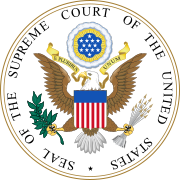 | |
 | |
| 38°53′26″N 77°00′16″W / 38.89056°N 77.00444°W / 38.89056; -77.00444 | |
| Established | March 4, 1789; 235 years ago (1789-03-04)[1] |
| Location | Washington, D.C. |
| Coordinates | 38°53′26″N 77°00′16″W / 38.89056°N 77.00444°W / 38.89056; -77.00444 |
| Composition method | Presidential nomination with Senate confirmation |
| Authorized by | Constitution of the United States |
| Judge term length | Life tenure |
| Number of positions | 9 (by statute) |
| Website | supremecourt |
| Chief Justice of the United States | |
| Currently | John Roberts |
| Since | September 29, 2005; 18 years ago (2005-09-29) |
| This article is part of a series on the |
| Supreme Court of the United States |
|---|
 |
| The Court |
| Current membership |
|
| Lists of justices |
|
| Court functionaries |
|
|
This is a list of the 37 cases reported in volume 51 (10 How.) of United States Reports, decided by the Supreme Court of the United States from December 1850 to May 1851.[2]
In 1874, the U.S. government created the United States Reports, and retroactively numbered older privately-published case reports as part of the new series. As a result, cases appearing in volumes 1–90 of U.S. Reports have dual citation forms; one for the volume number of U.S. Reports, and one for the volume number of the reports named for the relevant reporter of decisions (these are called ”nominative reports”).
Starting with the 42nd volume of U.S. Reports, the Reporter of Decisions of the Supreme Court of the United States was Benjamin Chew Howard. Howard was Reporter of Decisions from 1843 to 1860, covering volumes 42 through 65 of United States Reports which correspond to volumes 1 through 24 of his Howard’s Reports. As such, the dual form of citation to, for example, Butler v. Pennsylvania is 51 U.S. (10 How.) 402 (1851).
The Supreme Court is established by Article III, Section 1 of the Constitution of the United States, which says: ”The judicial Power of the United States, shall be vested in one supreme Court . . .”. The size of the Court is not specified; the Constitution leaves it to Congress to set the number of justices. Under the Judiciary Act of 1789 Congress originally fixed the number of justices at six (one chief justice and five associate justices).[3] Since 1789 Congress has varied the size of the Court from six to seven, nine, ten, and back to nine justices (always including one chief justice). When the cases in 51 U.S. (10 How.) were decided the Court comprised these nine members:
| Portrait | Justice | Office | Home State | Succeeded | Date confirmed by the Senate (Vote) |
Tenure on Supreme Court |
|---|---|---|---|---|---|---|
 |
Roger B. Taney | Chief Justice | Maryland | John Marshall | March 15, 1836 (29–15) |
March 28, 1836 – October 12, 1864 (Died) |
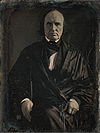 |
John McLean | Associate Justice | Ohio | Robert Trimble | March 7, 1829 (Acclamation) |
January 11, 1830 – April 4, 1861 (Died) |
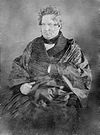 |
James Moore Wayne | Associate Justice | Georgia | William Johnson | January 9, 1835 (Acclamation) |
January 14, 1835 – July 5, 1867 (Died) |
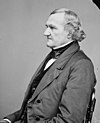 |
John Catron | Associate Justice | Tennessee | newly-created seat | March 8, 1837 (28–15) |
May 1, 1837 – May 30, 1865 (Died) |
 |
John McKinley | Associate Justice | Alabama | newly-created seat | September 25, 1837 (Acclamation) |
January 9, 1838 – July 19, 1852 (Died) |
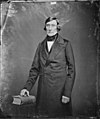 |
Peter Vivian Daniel | Associate Justice | Virginia | Philip P. Barbour | March 2, 1841 (25–5) |
January 10, 1842 – May 31, 1860 (Died) |
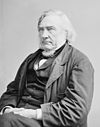 |
Samuel Nelson | Associate Justice | New York | Smith Thompson | February 14, 1845 (Acclamation) |
February 27, 1845 – November 28, 1872 (Retired) |
 |
Levi Woodbury | Associate Justice | New Hampshire | Joseph Story | January 31, 1846 (Acclamation) |
September 23, 1845 – September 4, 1851 (Died) |
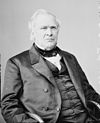 |
Robert Cooper Grier | Associate Justice | Pennsylvania | Henry Baldwin | August 4, 1846 (Acclamation) |
August 10, 1846 – January 31, 1870 (Retired) |
InStrader v. Graham 51 U.S. (10 How.) 82 (1851), the Supreme Court held that the status of three slaves who went by steamboat from the slave state of Kentucky to the free states of Indiana and Ohio depended on Kentucky law rather than on Indiana or Ohio law. (The slaves, however, later escaped to Canada.) Kentucky law made steamboat operators liable for the value of any slaves escaping by the boat. Writing for the Court, Chief Justice Roger Taney accepted the conclusions of the Supreme Court of Kentucky that refused to rule on the status of the slaves unless they were parties to the lawsuit, and that Kentucky need not apply Indiana or Ohio law under which the three slaves would be considered freed.
Under the Judiciary Act of 1789 the federal court structure at the time comprised District Courts, which had general trial jurisdiction; Circuit Courts, which had mixed trial and appellate (from the US District Courts) jurisdiction; and the United States Supreme Court, which had appellate jurisdiction over the federal District and Circuit courts—and for certain issues over state courts. The Supreme Court also had limited original jurisdiction (i.e., in which cases could be filed directly with the Supreme Court without first having been heard by a lower federal or state court). There were one or more federal District Courts and/or Circuit Courts in each state, territory, or other geographical region.
Bluebook citation style is used for case names, citations, and jurisdictions.
| Case Name | Page and year | Opinion of the Court | Concurring opinion(s) | Dissenting opinion(s) | Lower court | Disposition of case |
|---|---|---|---|---|---|---|
| Missouri v. Iowa | 1 (1851) | per curiam | none | none | original jurisdiction | state border decreed |
| Webster v. Cooper | 54 (1850) | Taney | none | none | C.C.D. Me. | remanded to divided lower court |
| Shelby v. Bacon | 56 (1850) | McLean | none | none | C.C.E.D. Pa. | remanded to divided lower court |
| McNulty v. Batty | 72 (1851) | Nelson | none | none | Sup. Ct. Terr. Wis. | writ of error abated |
| Preston v. Bracken | 81 (1851) | Nelson | none | none | Sup. Ct. Terr. Wis. | writ of error abated |
| Strader v. Graham | 82 (1851) | Taney | McLean, Catron | none | Ky. | dismissed for want of jurisdiction |
| Wilson v. Sanford | 99 (1851) | Taney | none | none | C.C.D. La. | dismissed for want of jurisdiction |
| Downs v. Kissam | 102 (1850) | McLean | none | none | C.C.S.D. Miss. | reversed |
| Hoyt v. United States | 109 (1850) | Nelson | none | none | C.C.S.D.N.Y. | affirmed |
| Ex parte Rhodes | 144 (1851) | Taney | none | none | D. Tex. | dismissal denied |
| Oldfield v. Marriott | 146 (1851) | Wayne | none | none | C.C.D. Md. | affirmed |
| Hallett v. Collins | 174 (1850) | Grier | none | none | C.C.S.D. Ala. | affirmed |
| Sears v. Eastburn | 187 (1850) | Taney | none | none | C.C.S.D. Ala. | reversed |
| Woodruff v. Trapnall | 190 (1851) | McLean | none | Grier | Ark. | reversed |
| Paup v. Drew | 218 (1851) | McLean | Daniel, Nelson | none | Ark. | affirmed |
| Trigg v. Drew | 224 (1851) | McLean | none | none | Ark. | affirmed |
| Greely v. Thompson | 225 (1851) | Woodbury | none | none | C.C.D. Mass. | affirmed |
| Maxwell v. Griswold | 242 (1851) | Woodbury | none | none | C.C.S.D.N.Y. | affirmed |
| Gilmer v. Poindexter | 257 (1851) | Daniel | none | none | C.C.D. La. | reversed |
| Barnard v. Adams | 270 (1851) | Grier | none | Daniel | C.C.S.D.N.Y. | affirmed |
| Henderson v. Tennessee | 311 (1851) | Taney | none | Woodbury | Tenn. | dismissed for want of jurisdiction |
| Stimpson v. Baltimore & S.R.R. Co. | 329 (1850) | Daniel | none | none | C.C.D. Md. | affirmed |
| Landes v. Brant | 348 (1851) | Catron | none | none | C.C.D. Mo. | affirmed |
| Philadelphia & W.R.R. Co. v. Maryland | 376 (1851) | Taney | none | none | Md. | affirmed |
| Baltimore & S.R.R. Co. v. Nesbit | 395 (1851) | Daniel | none | none | Baltimore Cnty. Ct. | affirmed |
| Butler v. Pennsylvania | 402 (1851) | Daniel | none | McLean | Pa. | affirmed |
| Washington, A. & G’town Steam Packet Co. v. Sickles | 419 (1851) | Grier | none | none | C.C.D.C. | reversed |
| United States v. Brooks | 442 (1851) | Wayne | none | none | C.C.D. La. | affirmed |
| Louisville Mfg. Co. v. Welch | 461 (1851) | Nelson | none | none | C.C.D. La. | reversed |
| Gayler v. Wilder I | 477 (1851) | Taney | none | McLean | C.C.S.D.N.Y. | affirmed |
| Gayler v. Wilder II | 509 (1851) | Taney | none | none | C.C.S.D.N.Y. | rehearing denied |
| Town of East Hartford v. Hartford Bridge Co. | 511 (1851) | Woodbury | none | none | Conn. | affirmed |
| Villalobos v. United States | 541 (1851) | Catron | none | none | Super. Ct. E. Fla. | affirmed |
| St. John v. Paine | 557 (1851) | Nelson | none | none | C.C.S.D.N.Y. | affirmed |
| Newton v. Stebbins | 586 (1851) | Nelson | none | Daniel | C.C.S.D.N.Y. | affirmed |
| United States v. D’Auterive | 609 (1851) | Daniel | none | none | D. La. | reversed |
| Robinson v. Minor | 627 (1851) | McLean | none | none | C.C.S.D. Miss. | affirmed |